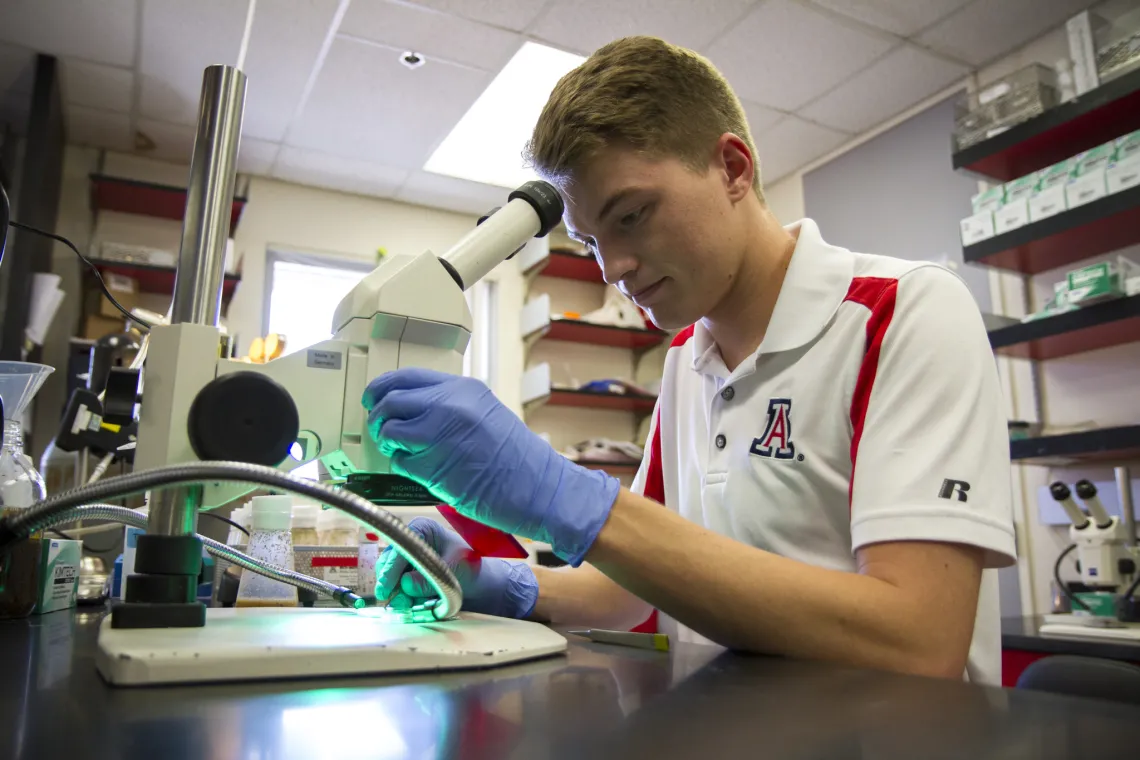Q&A: Mastering the Nervous System with Briggs Carhart
Get to know Briggs Carhart, a Master of Public Health student who studies the nervous system and is particularly interested in ALS.

Major: Epidemiology
Year: 1st year Master of Public Health
Career aspiration: Physician-scientist
What problem do you hope to solve as a researcher and why do you care about it?
I hope to solve a portion of the enigma that is the nervous system. The neurons and glial cells that constitute the brain form intricate networks to make you you and me me. Research in the brain sciences is crucial to further understand neurodevelopment and neurodegeneration. That way, we can understand how to form and maintain necessary connections while combatting and preventing disease.
More specifically, my research projects are studying the spider chemosensory pathways and studying bio-metal homeostasis in ALS. One project focuses on the development and evolution of the nervous system and the other focuses on disease and degeneration to discover novel therapeutics and drug treatments.
What or who inspired you to do this work?
My professors and advisers were a huge influence on my interest in research by telling me that research is one of the few ways to discover novel concepts in science and life. Dr. Lynne Oland, research professor and director of the Neuroscience and Cognitive Science (NSCS) Program, told me how she became involved in research. She started as a nurse and fell in love with the process of teaching and finding new understanding in science. I hope to bring teaching and new understanding to the medical field in my own way.
If you could have a dinner party with any three guests of your choosing (dead or alive), who would you invite?
• Stephen Hawking, because he was a brilliant physicist, and I would have loved to understand his perspective on ALS and medicine
• NSCS Program Coordinator Becca Van Sickler, because she’s awesome and funny
• J.K. Rowling, because Harry Potter all the way
What’s been your best, most memorable moment at UA so far?
I would say being a delegate for the UA to attend the Society for Neuroscience International Meeting in fall 2016. I was surrounded by 30,000 neuroscientists in San Diego Convention Center to talk about my research at the U of A and bring what I learned back to campus. The innovation, the passion, and the science was phenomenal.
What advice would you give to an incoming freshman?
• Pick a field of study you are genuinely interested in. You will do so much more if you’re having fun studying what you want to study.
• Listen to your major adviser.
• Everyone will hype your first finals week a little too much. Once you have a taste of your first finals week, it will feel a lot less stressful. Take a deep breath, eat some pancakes, and it will be okay!
What do you do outside of academics and research?
Outside of class and lab, I dance. I’m not the best dancer in the world, but it’s a fun break from everything else. I took over 3 years of dance classes at the UA School of Dance with a specialization in ballet.
If you were giving a speech at graduation, what message would you give to your peers about the future?
People operate like Hebb’s Rule: Neurons that fire together, wire together. The better connections become stronger and faster. The weaker and unnecessary connections are lost to save energy and resources. This is how the rest of your life will be. You will have strong connections between family, friends, co-workers, mentors, etc. Some connections will be lost, and that’s okay. In the brain, it’s not advantageous to have the most connections. It’s having the smartest connections that matter.
What tips would you give to students trying to get research funding?
You have to practice grant writing, but it’s a great skill to have. Google is your best friend, and you can ask your peers and mentors for suggestions, too.
For personal funding (yes, you can get paid for research), I would look for research programs. For biology-related research, you can apply for UBRP (the Undergraduate Biology Research Program). It’s a program that pays you an hourly rate to work in a lab for 35 hours per week over the summer and potentially for the school year as well.

